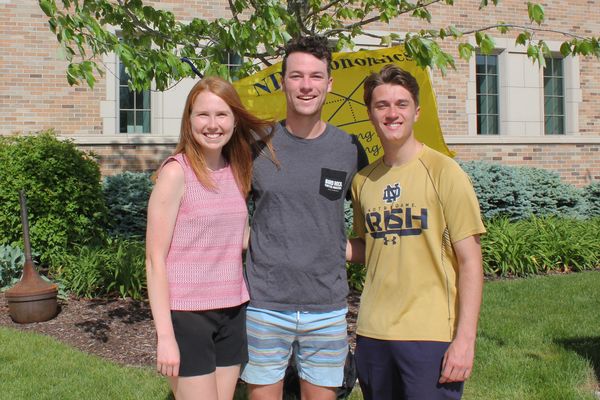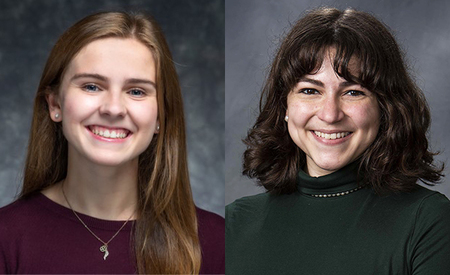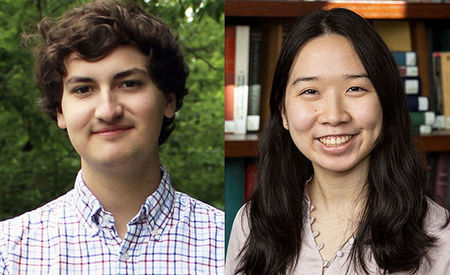

Seven seniors with majors in the Department of Economics have secured highly competitive pre-doctoral positions for after graduation.
Levi Bognar, Sean McConville, and Mary Treacy will serve as research assistants at the Federal Reserve Bank of Chicago, while Carolyn Davin and Madeline Penn will be joining the research department at the Federal Reserve Board of Governors. Additionally, Charles Hanzel has accepted a position at the National Bureau of Economic Research in Cambridge, Massachusetts, and Mika Inoue is headed to the Global Poverty Research Lab at Northwestern University.
Pre-doctoral positions are an increasingly common phenomenon that serve as a bridge between undergraduate and graduate studies, said Eric Sims, professor and chair of the Department of Economics, and students going into these positions must be well trained in modern economic theory and quantitative analysis.
“These positions are both prestigious and highly competitive,” Sims said. “In these roles, individuals work as research assistants — and often as coauthors — with leading professional economists on cutting-edge research aimed at solving some of the most pressing issues facing society.
“To have so many of our graduates going into these highly competitive positions speaks to the rigorous training our department provides in modern economic analysis. We are incredibly proud of these students and look forward to seeing where their careers go from here.”
“To have so many of our graduates going into these highly competitive positions speaks to the rigorous training our department provides in modern economic analysis. We are incredibly proud of these students and look forward to seeing where their careers go from here.”
Kindling a passion
McConville, who majored in economics and political science, looks forward to learning more about the intricate ways in which the research at the Chicago Federal Reserve impacts monetary policy.
He credits his economic coursework, his work as a research assistant at the Wilson Sheehan Lab for Economic Opportunities on campus, and his senior thesis project with preparing him for the position.
“The economics major has been absolutely crucial in preparing me,” McConville said. “The economic theory I have learned guides the way I see the world. It impacts both the questions I ask and how I search for the answers.”
Working at the Federal Reserve will offer a unique opportunity to learn about all phases of the academic research lifecycle, said Bognar — along with the chance to continue to surround himself with people who are as passionate about economics as he is.
The faculty in the Department of Economics helped to kindle that passion, he said.
“By far, the best thing about majoring in economics at Notre Dame is getting to learn from outstanding faculty,” Bognar said. “All of my economics professors have played a major role in growing my interest in the field. The combination of excellent teaching and availability outside the classroom fostered an amazing learning environment.”
A meaningful impact

Treacy, an economics major with a supplementary major in applied mathematics and computational statistics (ACMS), said the variety of tasks she’ll be working on at the Federal Reserve — including a mix of policy work and short- and long-term research projects — will allow her to continue to explore where her interests lie.
The experience will build on the discernment she did through multiple internships while at Notre Dame — at the Brookings Institution’s Africa Growth Initiative, in market research in Taiwan, with the Central Bank of Armenia, and with Dentsu in Tokyo.
“Each position was valuable in exposing me to different areas and developing new skills,” she said. “My economics coursework provided me with the foundational knowledge necessary for this role, and my research and internship experiences expanded my knowledge base and skill set so that I feel prepared to work in any area they need.”
Davin, also an economics and ACMS major, is looking forward to working and living in Washington, D.C., as well as the opportunity to work on projects that will have a meaningful impact on the economy.
She plans to pursue a Ph.D. in economics after the two-year position and said the variety of classes she has taken has been invaluable.
“I loved being able to take classes on different aspects of macroeconomics, and I especially enjoyed my Economics of Education class with my thesis advisor, Chloe Gibbs,” she said. “The classes introduced me to a new way of thinking that is unique to economics and gave me a framework through which to solve problems, which will be necessary for my work at the Fed.”
A clearer vision

Inoue, who is joining Northwestern’s Global Poverty Research Lab, wrote a senior thesis that drew on engineering, law, and math as well as economics to address problems associated with groundwater pumping. It served as the culmination of her academic interests and prepared her for her post-graduation career.
“It's just been a great opportunity,” she said. “I've come out of it learning so much more about this field, and it's been really interesting to see that I can explore beyond things that I was used to.”
At the National Bureau of Economic Research, Hanzel is especially excited to learn from experts in the fields of health economics and health policy.
The design of the economics major, he said, has provided excellent preparation for his new position.
“The core requirements gave me a foundation in economic theory and concepts, while the upper-level, writing-intensive courses taught me how to critically analyze research and to take the lead on my own empirical projects. The ability to interpret, produce, and critique economic research will be essential at NBER.”
Penn, an international economics major with a concentration in Spanish and a supplementary major in ACMS, is looking forward to refining her research skills and gaining a clearer vision of what area of economics she’d like to focus on in a Ph.D. program.
The research opportunities she has had in Arts & Letters — and, particularly, her senior thesis on the role of censorship in the campaign for the 2016 Colombian peace referendum — were crucial to securing the role, she said.
“I couldn’t have gotten this position without the research experiences I have had as an international economics major — much of my interview was spent discussing my senior thesis,” she said. “My first experience as a research assistant on campus helped me get an internship at the American Enterprise Institute. And then, around that time, I began work on my thesis. All of these combined have helped me approach this job with a solid understanding of economic research.”
Originally published by at al.nd.edu on May 21, 2021.